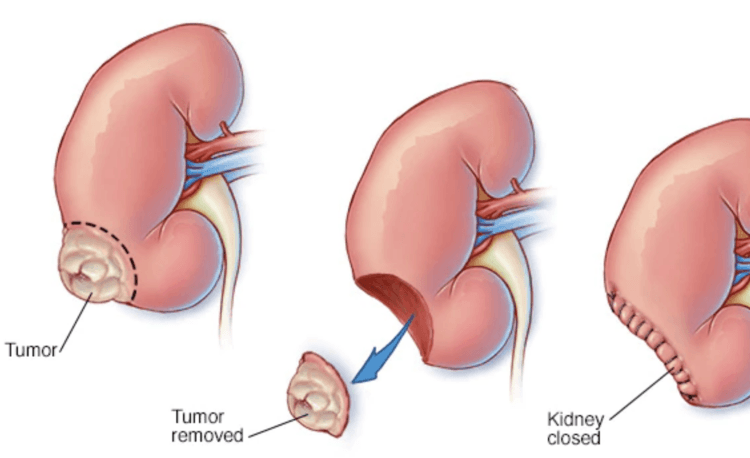Nephrectomy in Bulgaria
Search and Compare the Best Clinics and Doctors at the Lowest Prices for Nephrectomy in Bulgaria

Find the best clinics for Nephrectomy in Bulgaria
No clinics available
Morocco offers the best prices Worldwide
Price: $ 1,228

- Home
- Bulgaria
WHY US?
At Medijump, we're making medical easy. You can search, compare, discuss, and book your medical all in one place. We open the door to the best medical providers worldwide, saving you time and energy along the way, and it's all for FREE, no hidden fees, and no price markups guaranteed. So what are you waiting for?

Free

Best Price

Widest Selection

Risk-Free
What you need to know about Nephrectomy in Bulgaria

Nephrectomy is the surgical removal of all or part of a kidney. There are two types of surgery for nephrectomy: radical nephrectomy (to remove the entire kidney and tissues of fat that surround the kidney) and partial nephrectomy (removes only diseased tissue from a kidney and leaves the healthy tissue in place). The surgery is performed to treat kidney cancer and other kidney diseases. Sometimes, it is also performed to remove a healthy kidney from a donor for a transplant.
What does a Nephrectomy Procedure Involve?
Nephrectomy can be performed through laparoscopic or open surgery. Both are performed under general anesthetic. Laparoscopic nephrectomy is usually performed to remove part of your kidney. Your surgeon makes small incisions in your abdomen to insert the laparoscope and small surgical tools. If your entire kidney needs to be removed, your surgeon will use open surgery. During open surgery, your surgeon makes one large incision on your abdomen or along your side.
How Long Should I Stay in Bulgaria for a Nephrectomy Procedure?
You are required to stay in the hospital for two to five days. Plan to stay in Bulgaria for around 10 to 14 days because you are likely to develop deep vein thrombosis after the surgery. You will also need to attend follow-up checkups, during which your surgeon will remove your stitches.
What's the Recovery Time for Nephrectomy Procedures in Bulgaria?
The recovery period after a nephrectomy may take around three to six weeks. During your recovery period, you should avoid any strenuous activity and follow the post-operative instruction that your surgeon gives you. The instruction usually includes dietary restriction, exercise, and care for your healing wounds
What sort of Aftercare is Required for Nephrectomy Procedures in Bulgaria?
Most people can function well with only one kidney. After the procedure, you can resume your daily routine and activities after 3 weeks. However, you will likely need checkups to monitor kidney function. These include monitoring your blood pressure, waste filtration, and protein urine levels. Since you only have one kidney, you will need to eat a healthy diet and engage in regular exercise to preserve normal kidney function.
What's the Success Rate of Nephrectomy Procedures in Bulgaria?
Nephrectomy is generally safe and the risks are very small. Partial nephrectomy has about a 95% success rate. Nevertheless, the procedure carries potential risks, such as bleeding, injury to nearby organs, infection, post-operative pneumonia, and rare allergic reaction to anesthesia.
Are there Alternatives to Nephrectomy Procedures in Bulgaria?
For certain illnesses, there are alternatives that do not need the removal of a kidney. The alternatives include renal embolization.
What Should You Expect Before and After the Procedure
After nephrectomy, you will no longer experience symptoms that you had before the surgery. The risk of cancer, as well as cancer spreading to other parts of your body, is also reduced. Remember that taking care of your remaining kidney is extremely important.
Whilst the information presented here has been accurately sourced and verified by a medical professional for its accuracy, it is still advised to consult with your doctor before pursuing a medical treatment at one of the listed medical providers
No Time?
Tell us what you're looking for and we'll reachout to the top clinics all at once
Enquire Now

Popular Procedures in Bulgaria
Prices Start From $2,487

Prices Start From $825

Recommended Medical Centers in Bulgaria for procedures similar to Nephrectomy

- Interpreter services
- Translation service
- Religious facilities
- Medical records transfer
- Medical travel insurance
- Health insurance coordination
- TV in the room
- Safe in the room
- Phone in the room
- Private rooms for patients available

- Interpreter services
- Translation service
- Religious facilities
- Medical records transfer
- Medical travel insurance
- Health insurance coordination
- TV in the room
- Safe in the room
- Phone in the room
- Private rooms for patients available

- Interpreter services
- Translation service
- Religious facilities
- Medical records transfer
- Medical travel insurance
- Health insurance coordination
- TV in the room
- Safe in the room
- Phone in the room
- Private rooms for patients available

- Interpreter services
- Translation service
- Religious facilities
- Medical records transfer
- Medical travel insurance
- Health insurance coordination
- TV in the room
- Safe in the room
- Phone in the room
- Private rooms for patients available

- Interpreter services
- Translation service
- Religious facilities
- Medical records transfer
- Medical travel insurance
- Health insurance coordination
- TV in the room
- Safe in the room
- Phone in the room
- Private rooms for patients available

- Interpreter services
- Translation service
- Religious facilities
- Medical records transfer
- Medical travel insurance
- Health insurance coordination
- TV in the room
- Safe in the room
- Phone in the room
- Private rooms for patients available

- Interpreter services
- Translation service
- Religious facilities
- Medical records transfer
- Medical travel insurance
- Health insurance coordination
- TV in the room
- Safe in the room
- Phone in the room
- Private rooms for patients available

- Interpreter services
- Translation service
- Religious facilities
- Medical records transfer
- Medical travel insurance
- Health insurance coordination
- TV in the room
- Safe in the room
- Phone in the room
- Private rooms for patients available

- Interpreter services
- Translation service
- Religious facilities
- Medical records transfer
- Medical travel insurance
- Health insurance coordination
- TV in the room
- Safe in the room
- Phone in the room
- Private rooms for patients available

- Interpreter services
- Translation service
- Religious facilities
- Medical records transfer
- Medical travel insurance
- Health insurance coordination
- TV in the room
- Safe in the room
- Phone in the room
- Private rooms for patients available
Nephrectomy in and around Bulgaria
Introduction
Bulgaria has plenty to offer and tourists are going to be very impressed with the country’s mountainous landscapes, beautiful Black Sea beaches, fascinating history, friendly locals, lively nightlife, and affordability. Although the country’s holiday tourism is very much on the radar, it is also actually quite popular with medical tourists, due to its modern medical centers, highly trained medical professionals, state-of-the-art equipment, affordable healthcare, and mineral baths, thousands of medical tourists visit this country each year. Most of the medical tourists come for dental treatment, orthopedic surgery, elective surgery, neurosurgery, as well as health screening.
Popular Cities and Regions in Bulgaria
Bulgaria’s laid-back capital city, Sofia, is truly a must-visit. It is full of museums, Ottoman mosques, communist architecture, chic galleries, Eastern Orthodox churches, amazing restaurants, and upbeat clubs. One of the most popular landmarks in the country is the Aleksander Nevski Cathedral, which is an awe-inspiring church built between 1882 and 1912 to honor 200,000 Russian soldiers who died fighting for the independence of Bulgaria during the Russo-Turkish war. If you want to relax on beautiful beaches visit Varna, which is a major tourist destination during the summer. The second-largest, city in Bulgaria is Plovdiv and it is one of the oldest continuously inhabited cities in Europe. Tourists are attracted by the Roman Amphitheatre, Archeological Museum, and Tsar Simeon Central Garden.
Transport in Bulgaria
Most international tourists will arrive at Sofia Airport, which serves flights to most numerous major cities in Europe and the Middle East. There are several budget airlines that operate flights from this airport, including Ryanair and Wizz Air. Domestic flights are available, but they tend to be expensive. Therefore, to travel from one city to another, trains and buses are the best option. Buses and trains are punctual and affordable. However, if you are in a hurry, you should avoid trains as they can be a little slow. To travel around big cities, taxis are widely available and are really cheap. Just make sure you choose a licensed taxi to avoid being overcharged.
Visas in Bulgaria
While Bulgaria is not yet a part of the Schengen Area, it has a visa policy that is based on the Schengen system. Therefore, holders of Schengen Visa are allowed to enter the country. Additionally, citizens of 62 countries, including the US, Australia, and the UAE, can stay in the country for up to 90 days without a visa.
Weather in Bulgaria
From June to August, Bulgaria experiences summer. The weather can get a bit hot and humid, with an average temperature of 19°C to 21°C. July is the wettest month in the country. Winter, from December to February, is usually freezing. Autumn and Spring bring pleasant weather.
Additional Info
- Local Currency: The official currency is the Bulgarian Lev (BGN). 1 USD will get you approx. 1.8 BGN.
- Money & Payments: You can find ATMs in every city in the country. Credit cards are accepted in bigger restaurants and hotels. Tipping is sometimes expected.
- Local Language: Bulgarian is the official language in Bulgaria. Turkish and Roma are spoken by a minority of people. English is becoming more and more common in the country, but it is not widely spoken.
- Local Culture and Religion: Christianity dominates the population of Bulgaria, followed by Islam and Judaism.
- Public holidays: Bulgaria celebrates several historical and religious holidays, such as Orthodox Good Friday, Orthodox Easter Day, Independence Day, Culture and Literacy Day, Christmas Day, and Liberation Day.
Popular Searches
- Plastic Surgery in Thailand
- Dental Implants in Thailand
- Hair Transplant in Thailand
- Breast Augmentation Thailand
- Gastric Sleeve in Thailand
- Gender Reassignment Surgery in Thailand
- Laser Hair Removal in Bangkok
- Botox in Bangkok
- Dermatology in Bangkok
- Breast Augmentation in Bangkok
- Coolsculpting in Bangkok
- Veneers in Turkey
- Hair Transplant in Turkey
- Rhinoplasty in Turkey
- Stem Cell Therapy in Mexico
- Rhinoplasty in Mexico
- Liposuction in Mexico
- Coolsculpting in Tijuana
- Rhinoplasty in Korea
- Scar Removal in Korea
- Gastric Sleeve in Turkey
- Bone Marrow Transplant in India
- Invisalign in Malaysia
- Plastic Surgery in the Dominican Republic
- Tummy Tuck in the Dominican Republic
- Plastic and Cosmetic Surgery in Poland
- Rhinoplasty in Poland
- Hair Implant in Poland
- Dental Implants in Poland
- IVF in Turkey